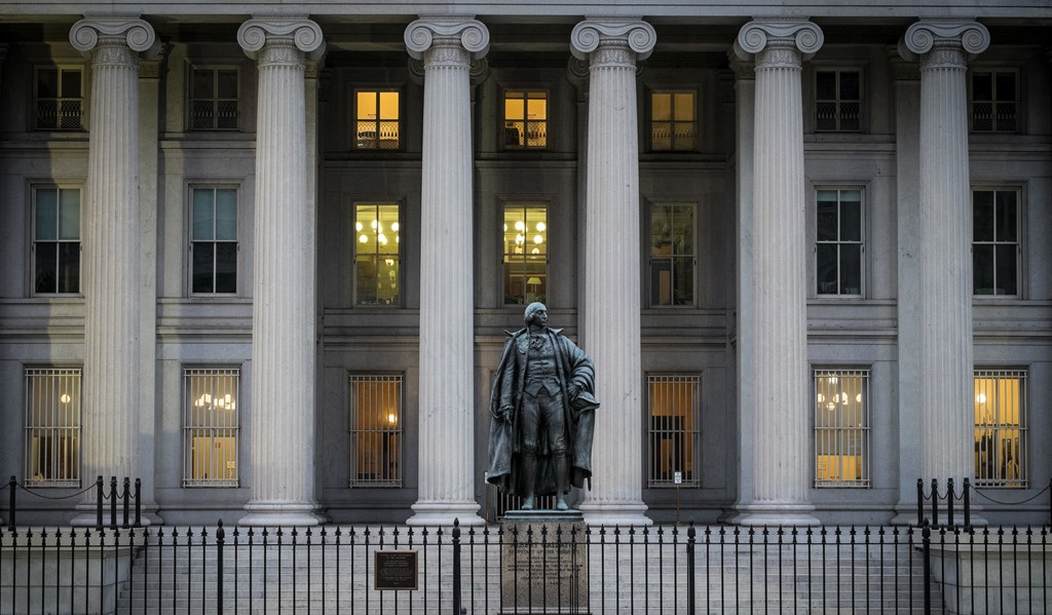The amendment the platform advocates would limit federal spending to a percentage of gross domestic product and require a supermajority in Congress to approve "any tax increase."
Such an amendment would be a good thing -- not only because of what the Obama administration has done but also because of what Republicans in Congress have done.
"The current administration's refusal to work with Republicans took our national debt from $10 trillion to nearly $19 trillion today," says the platform.
"At the same time the administration's policies systematically crippled economic growth and job creation, driving up government costs and driving down revenues," it says. "When Congressional Republicans tried to reverse course, the administration manufactured fiscal crises -- phony government shutdowns -- to demand excessive spending."
Yet the Constitution gives Congress the power to control federal spending.
In 2010, after a Democrat-controlled Congress enacted Obamacare and ran a trillion-dollar-plus deficit for the second fiscal year in a row, American voters gave Republicans a majority in the House.
The Republican-controlled House cut its first spending deal with Obama in March 2011. Since then, the federal debt has increased by more than five trillion dollars in less than five and a half years.
In 2014, voters gave Republicans control of the Senate as well as the House.
Recommended
Last October, Republican congressional leaders cut a budget deal with President Obama that suspended any limit on the federal debt until March 2017. For incumbents of both parties, that effectively postponed any battle over the federal debt until after this year's election.
The Republican Congress and President Obama have not yet agreed on appropriations laws for fiscal 2017, which begins Oct. 1 -- a little more than a month before the election.
It is possible the Republican Congress could cut a short-term spending deal with Obama that appropriates funds for the first several weeks of the fiscal year -- pushing it past the election -- so Obama and members of the current Congress can cut another spending deal after the election and before the new president and Congress take office.
That would be what they call "bipartisanship."
The Congressional Budget Office reported last week that its long-term estimates show the federal government headed toward a level of "debt held by the public" (securities sold by the U.S. Treasury) as a percentage of gross domestic product that this nation has never seen before.
"Federal debt held by the public, which was equal to 39 percent of gross domestic product at the end of fiscal year 2008, has already risen to 75 percent of GDP in the wake of a financial crisis and a recession," said CBO. "In CBO's projections, that debt rises to 86 percent of GDP in 2026 and to 141 percent in 2046 -- exceeding the historical peak of 106 percent that occurred just after World War II."
This increasing debt, according to CBO, makes "a fiscal crisis more likely."
"Specifically," said CBO, "investors might become less willing to finance the government's borrowing unless they were compensated with high interest rates. As a result, interest rates on federal debt would abruptly become higher than the rates of return on other assets, dramatically increasing the cost of future government borrowing. In addition, that increase would reduce the market value of outstanding government bonds. If that happened, investors would lose money. The potential losses for mutual funds, pension funds, insurance companies, banks, and other holders of government debt might be large enough to cause some financial institutions to fail, creating a fiscal crisis."
Major federal benefit programs -- especially those that benefit retiring baby boomers -- are pushing America in this direction.
"In CBO's projections, deficits rise during the next three decades because the government's spending grows more quickly than its revenues do," said CBO. "In particular, spending grows for Social Security, the major health care programs (primarily Medicare), and interest on the government's debt."
America is moving toward a fiscal crisis because over the past eight decades -- beginning with the presidency of Franklin Roosevelt -- Congress has created and sustained programs that make increasing numbers of Americans dependent on government for key elements in their life (including income and health care).
To balance the federal budget, America needs fewer people dependent on government.
Can and will future Congresses reform -- or, better yet, privatize -- Social Security and Medicare so Americans are not made to pay steep payroll taxes to the federal government in their working years and then forced into government dependency (and thus government control) later in life?
Will they roll back the Medicaid welfare program Obamacare expanded?
A balanced budget -- with or without a constitutional mandate for it -- would require such changes.
Will Congress control the federal debt or will it let that debt ultimately control us?
























Join the conversation as a VIP Member